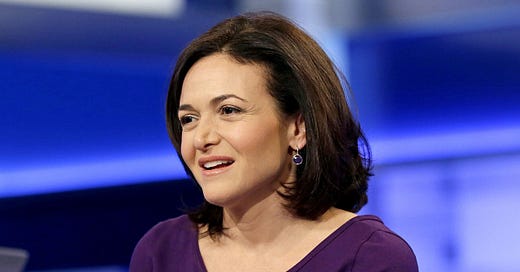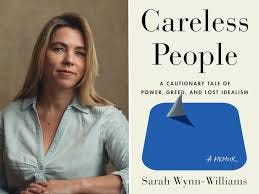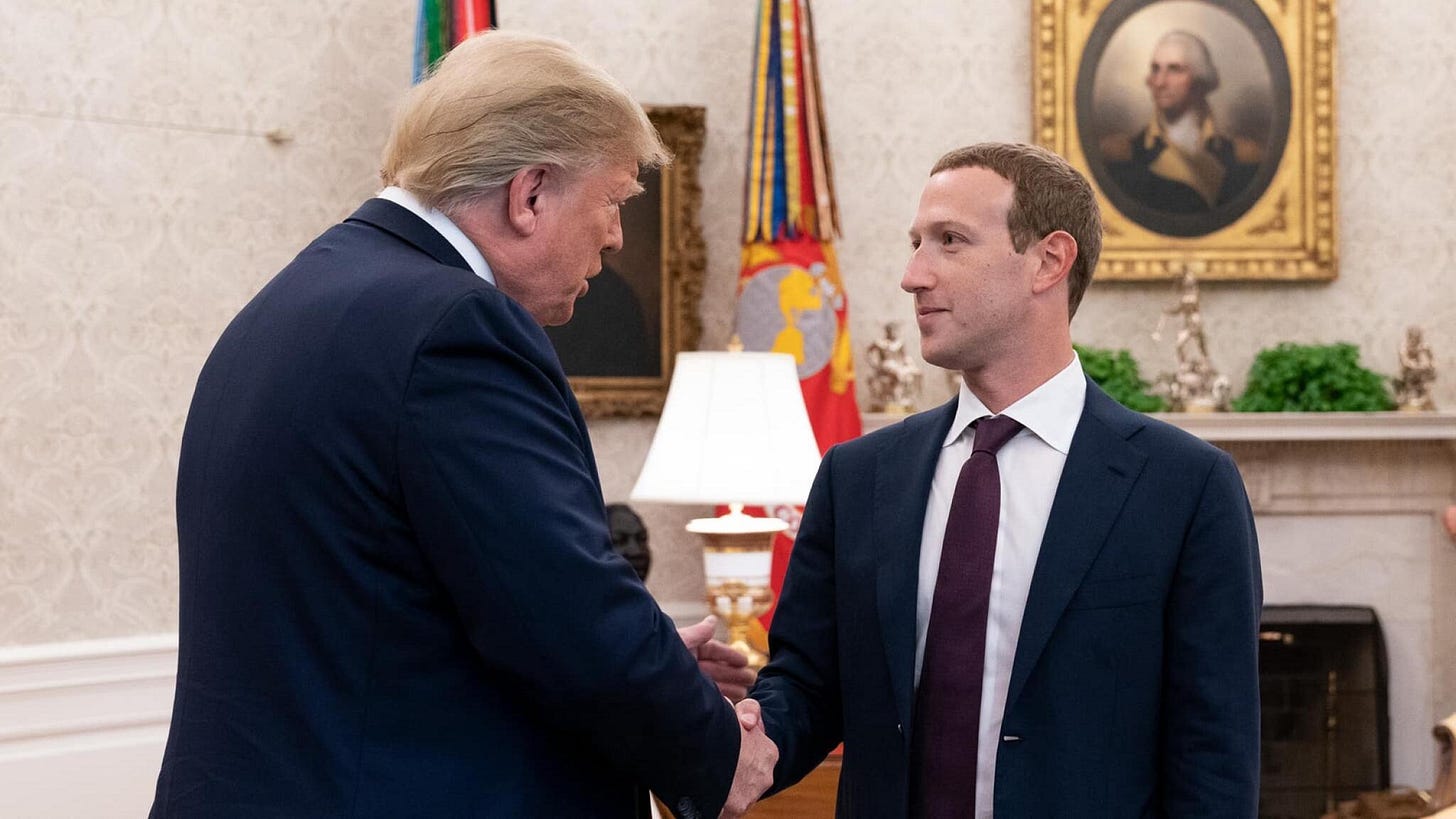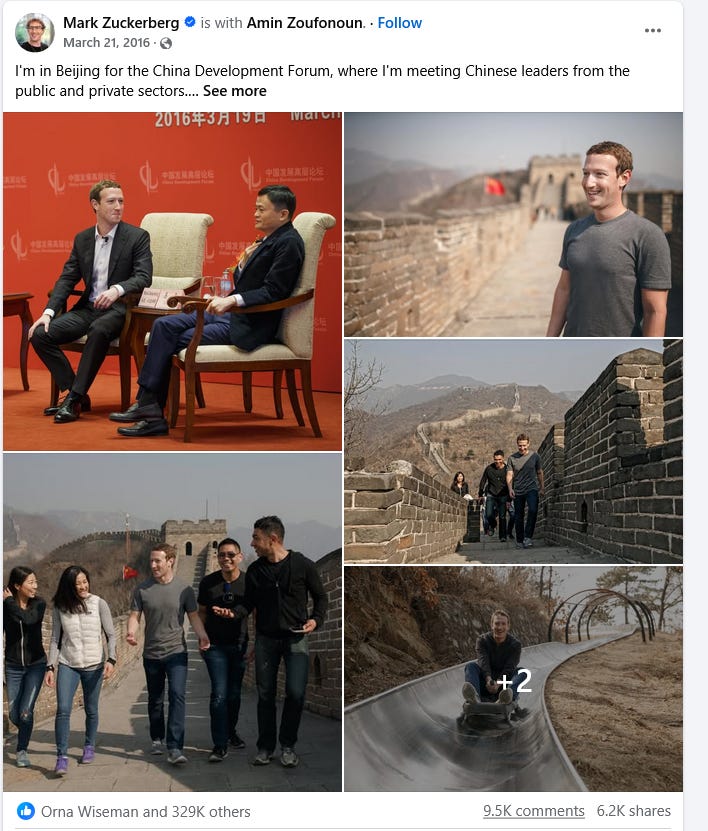I read the Facebook tell-all book. You should, too.
Careless People by Sarah Wynn-Williams is a must read if you want to understand our insane world. Here are some of my take-aways.
Most of the reviews of Sarah Wynn-Williams’ book Careless People: A Cautionary Tale of Power, Greed, and Lost Idealism focus on Sheryl Sandberg’s undergarments.
I’m not kidding — you can google it. I admit, chapter 28, “Lean in and lie back” is quite a zinger. Stories of Sandberg forcing assistants to buy expensive lingerie and come into bed with her in the bedroom of the company’s fancy private jet certainly contrast with her well-polished image of Savior of Women. But I’m not sure that the public obsession with her lingerie is really about our disappointment in feminist icons. That particular let-down, in which public feminists behave very unfeministically in private — a dynamic that I’ve experienced in real life too many times to count — does not seem to be what motivates the underwear interest. The attention feels more like, well, you know, just a typical a naked-women thing. It’s just sexist gawking. Makes a grabby headline. Clickbait, in FB lingo. But it’s not really the point of the stories. Or of the book.
Also, the revelation that Sheryl Sandberg is more of a narcissistic diva than an actual feminist leader is almost trivial compared to the central bombshells that this book reveals. Well, almost trivial. Yes, it’s annoying and upsetting and creates a toxic atmosphere for her staff. But by contrast, the rest of the stuff in the book offers a glimpse at the workings of some of the most powerful forces affecting our entire world — and wow, is it dark. Like, worse than we all imagined, I think.
But I’ll come back to Sandberg. Because, actually, she does matter. Though not because of the expensive underwear.
At its core, this book tells the inside stories of how Facebook really works, what has driven it to become one of most powerful engines of our culture and society, and why the world looks the way it does right now.
In a word: Money.
Well, maybe money AND power.
And maybe ego.
Or some combination.
But mostly, really, money.
For most of its existence, the only thing that had mattered at Facebook is money. How to get more users so they could make more money. How they could harvest data so they could make money. How they could enter new markets so they could get new users so they could mine more data so they could make more money. And on and on.
There is no ideology, there are no scruples, nobody running the company has a moral backbone, and its actions completely reflect that. It is all about growth in numbers, ergo money, to degrees that are incomprehensible to normal people (not the “price insensitive” staff, a euphemism for people who have so much money that they do not know prices of things). In more recent years, that greed has translated into political activity, but it wasn’t always that way. Actually, the author is at the center of the movement towards politics, often the one pushing towards political involvement, though from a liberal-progressive perspective of wanting to improve society and people’s lives, a perspective that time and again is ignored and quashed on the altar of profits. She taught Mark Zuckerberg how to care about meeting world leaders. She turned him into what he is today. And even as he publicly says he is moving away from “politics”, I think what he really means is that he is moving away from trying to take sides on things. Which, frankly, he never did anyway. It was always about the money for him. And now he’s just being more honest about it.
But I digress. Getting back to the author’s story. To truly understand what the world has witnessed over the past decade, it is helpful — vital, actually — to hear what this author has to say. It explains everything about we are all living through right now. Well, maybe not everything, but quite a lot. Here are a few bits that stood out for me:
Trump 2016
They called it the Facebook Election. Even though Mark Zuckerberg initially tried to deny that Facebook determined the outcomes of the 2016 presidential election, an abundance of evidence demonstrated that it is true. FB most definitely got Trump elected. On purpose. That was the whole point.
It gets worse. Shortly after the election, following an initial NYTimes expose on this that the company thought would signal the end of FB (way before the really bad stuff came out), Zuckerberg was scheduled to host a roundtable full of world leaders (as in, presidents and prime ministers, such as Trudeau and others.) His team prepped him for what they thought would be a lashing. After all, this is bad, right? A tech company using its tools for mining people’s data and playing with their minds using fake news coming from Russian bots to determine who becomes President of the United States? His staff was nervous. They thought they would all be toast.
Instead of a thrashing, this meeting with world leaders turned into what the author calls a “bubble bath”. These leaders were all kissing Zuckerberg’s ring, trying to find out from him how they, too, can use FB to get themselves elected. Politicians, she writes, ultimately want one thing: To hold office. Whatever it takes.
So that happened.
China
For years, Zuckerberg apparently talked about China. China, China, China. Why? Very simple: 600 million potential users. All he had to do in order to get that “growth” was give them away to the Chinese government. Even though FB rejected the incessant requests of governments around the world to collect users’ data for so-called “law enforcement”, FB did exactly that with China. FB China is an arm of the government, and was set up with full collaboration in the government’s collection of personal data. All of it. For what purpose? Did FB care at all about authoritarianism and human rights abuses? Of course not. Or the possibility that Chinese people, or even its own employees, might be in danger? Not even a little.
And did FB admit this to Congress when questioned? Of course not. Complete denial. According to the author, the company leaders sat there and lied to the committee. Just lied about all of it.
Breaking laws — and employees — around the world
The Chinese FB company was actually illegal, and apparently set up under different names and entities under the identity of a FB employee’s spouse. They regularly disregarded laws in countries around the world — as signs around the company encouraging people to “Think wrong, move fast, and break things”, as if that’s the right strategy. The heads — Mark Zuckerberg, Sheryl Sandberg, Elliot Schrage, Joel Kaplan — were insulated. But they had no problem risking the lives of their employees. Again, it was all about money.
How do we know that the company does not care about its employees and is willing to throw them under the bus? Because according to this account, the leaders had discussions about what would happen if someone needed to be arrested in a hostile country. Who they would designate to be arrested. At one point, in the context of discussions about FB in Jakarta, the company told Sara that she needs to go and be prepared to possibly be arrested. (She was breastfeeding her 7 month old baby at the time. And just generally did not realize that getting arrested in a hostile country was part of the job description.)
Although Sara herself never was arrested, a different employee was arrested in Brazil — Diego Dzodan. For refusing to hand over user data — but not in a good way. Law enforcement was trying to stop a brutal drug trafficking and organized crime group. FB was definitely on the wrong side of that, and hence the FB employee was arrested. And what did Zuckerberg do? He spent the day crafting a FB post about it. NOT trying to get the guy out of jail. NOT contacting all his connections to help him. No, no, it was all about the post, what he wanted to call “A Heartwarming Story”, spinning this to be about loyalty or care or something. It was all quite twisted.
All this by way of saying that the company is cutthroat, ruthless, and heartless, willing to throw its own people under the bus — or, rather, into jail — again, on the altar of, you guessed it, MONEY.
So what if people die? Not our problem
Anyone following the story of the Rohingya genocide in Myanmar knows what FB is capable of doing. It is widely agreed that FB played a strong role in all of that. FB actively promoted hate that led to violence.
In case you had any doubts about this, the book reveals that the leaders of FB knew about this and absolutely did not care about who they were signing on with. Just like in China, FB leaders will do anything — literally anything, with anyone — in order to get a deal to reel in more users. Especially in places that they had not tapped into yet and were eying. The stories in Myanmar are shocking. It is worse than we imagined. You have to read it to believe it.
Because if FB can, let’s see, swing elections to billionaire autocrats, enable dictatorships to mine data on all citizens, or create a civil war in which violent, racist juntas get into power, what can’t it do?
And also, so what if teenagers die?
Remember that report that came out in Australia about how FB was causing an increase in teenage depression and suicide?
So, the big question is, did FB know?
Well, apparently, not only did they know, but they actually did this on purpose.
Again, anything for “growth”, for reeling in new users, new untapped demographics, more money. Prey on their vulnerabilities. Trap them in.
It’s not just that the folks at FB have no ethical guidelines. They DO have guidelines. And those guidelines are: Do whatever it takes to make us more money. It doesn’t matter if people die. That’s not our problem. Just get us more users, more demographics, more harvested data, more money.
Back to the sexual harassment thing
So, on top of all this, FB culture is — according to this book — crawling with sexual harassment. In fact, the author writes that she often contemplated leaving but felt like she couldn’t because of issues of citizenship, visas, and healthcare (she was not an American citizen for most of her years there, and also nearly died in childbirth, and also was discovered to have a cancer thing). So she stayed on, which meant she was compromising her own morals for a long time. AND it also meant that she was enduring sexual harassment from Joel Kaplan, a former Republican high-up and Sheryl Sandberg bestie from Harvard, who regularly inquired about the author’s body and private parts, even when she had recently come out of a coma and was still haemorrhaging. Joel thought that was all, you know, hot.
And, as you might guess, what eventually forced her to leave the company?
She reported him.
Even though the company had a kind of underground group forming of women figuring out how to navigate this sexual harassment culture (“Feminist Fight Club” they called it, after the book), that didn’t help Sarah. As soon as she started to report the sexual harassment, she began getting frozen out of her job, demoted, and eventually fired on the spot. It’s an all-too-familiar story that so many women I know have been through in various iterations.
This is a not-so-surprising revelation about FB, considering what we know about sexual harassment in hi-tech bro-country, such as Uber, for example. It just raises more questions for me about the connections between these things. Why does it seem like the worst people running so much of the world are ALSO rapists, harassers, and misogynists? (Trump, Kavanaugh, and like half of Trump’s cabinet at this point…) I mean, how are all these things connected? they clearly are…
And btw, Joel Kaplan, the guy relentlessly harassing the author, absolutely LOVED Brett Kavanaugh and went to Washington for his hearings to support him while he was being accused of sexual harassment in the Senate. Kaplan sat a few rows behind him. And made a party in his house when he was sworn in. How are these things connected? That is really my big question.
Also, by the way, this is where Sheryl Sandberg’s behavior becomes relevant. If she was part of this harassment (which it seems like she was, in her own twisted way), then she is part of this global problem of women being stymied in their professional aspirations due to sexually toxic workplaces. And Sandberg, with all her TED talk and book stuff happening, is part of the problem, not the solution.
****
And there’s one more aspect to all this which the author reluctantly points out towards the end. She writes about how the big jobs and big packages are often given to friends, exes, and college buddies of the leadership, rather than to people most competent. (Joel Kaplan for example, became like number 3 or 4 in the company with zero relevant experience. He had been a Bush policy aide…). Towards the end of her journey, when she is realizing the end is coming, someone explains this to her by saying that they are all part of the same clique.
What clique is that? Jewish Harvard graduates. Or in Zuckerberg’s case, a not-quite-graduate.
She writes that she was reluctant to even have the discussion for fear of entering antisemitism territory. But apparently this rings true, as squirmy as it will make Jewish readers. After all, Mark, Sheryl, Elliot, Joel — it fits.
That was, well…. let’s say not what I wanted to find out.
***
So what’s my grand take-away from all this? What can we do? What should we do?
I have no idea. Honestly. I just don’t know. If you have thoughts, please share.
All I do know that I will be recommending this book to everyone I know. At the very least, we should be aware of the world that we are living in.
####
Keep reading with a 7-day free trial
Subscribe to The Roar to keep reading this post and get 7 days of free access to the full post archives.









